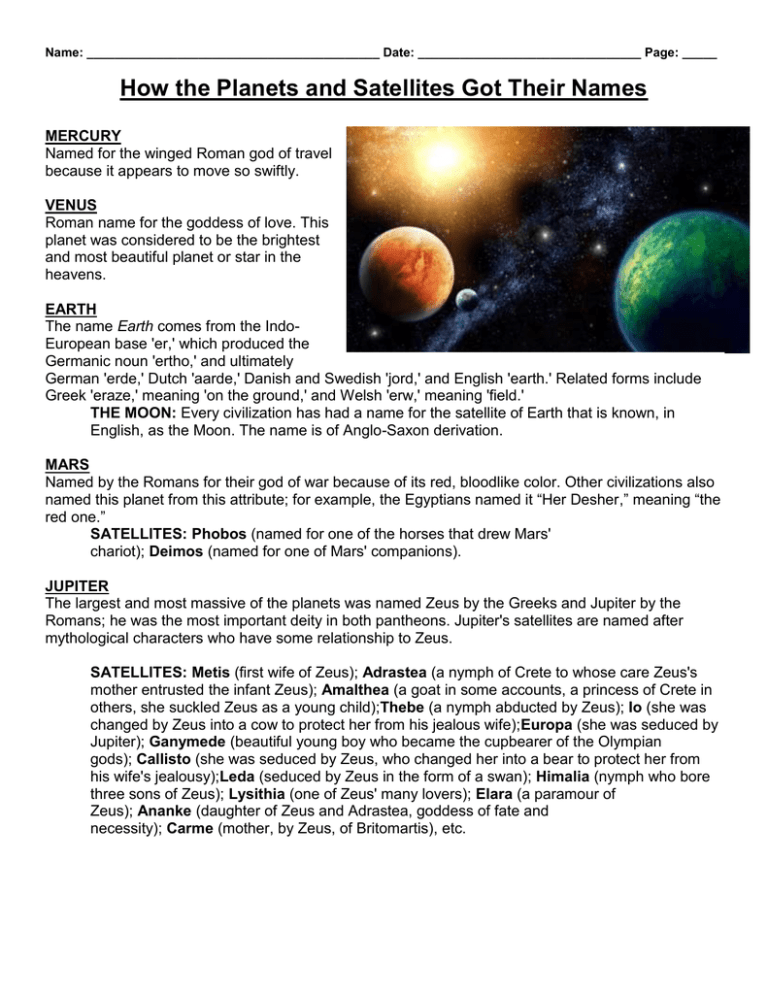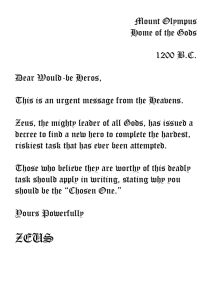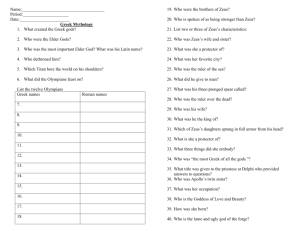How the Planets and Satellites Got Their Names
advertisement

Name: __________________________________________ Date: ________________________________ Page: _____ How the Planets and Satellites Got Their Names MERCURY Named for the winged Roman god of travel because it appears to move so swiftly. VENUS Roman name for the goddess of love. This planet was considered to be the brightest and most beautiful planet or star in the heavens. EARTH The name Earth comes from the IndoEuropean base 'er,' which produced the Germanic noun 'ertho,' and ultimately German 'erde,' Dutch 'aarde,' Danish and Swedish 'jord,' and English 'earth.' Related forms include Greek 'eraze,' meaning 'on the ground,' and Welsh 'erw,' meaning 'field.' THE MOON: Every civilization has had a name for the satellite of Earth that is known, in English, as the Moon. The name is of Anglo-Saxon derivation. MARS Named by the Romans for their god of war because of its red, bloodlike color. Other civilizations also named this planet from this attribute; for example, the Egyptians named it “Her Desher,” meaning “the red one.” SATELLITES: Phobos (named for one of the horses that drew Mars' chariot); Deimos (named for one of Mars' companions). JUPITER The largest and most massive of the planets was named Zeus by the Greeks and Jupiter by the Romans; he was the most important deity in both pantheons. Jupiter's satellites are named after mythological characters who have some relationship to Zeus. SATELLITES: Metis (first wife of Zeus); Adrastea (a nymph of Crete to whose care Zeus's mother entrusted the infant Zeus); Amalthea (a goat in some accounts, a princess of Crete in others, she suckled Zeus as a young child);Thebe (a nymph abducted by Zeus); Io (she was changed by Zeus into a cow to protect her from his jealous wife);Europa (she was seduced by Jupiter); Ganymede (beautiful young boy who became the cupbearer of the Olympian gods); Callisto (she was seduced by Zeus, who changed her into a bear to protect her from his wife's jealousy);Leda (seduced by Zeus in the form of a swan); Himalia (nymph who bore three sons of Zeus); Lysithia (one of Zeus' many lovers); Elara (a paramour of Zeus); Ananke (daughter of Zeus and Adrastea, goddess of fate and necessity); Carme (mother, by Zeus, of Britomartis), etc. SATURN Saturn was the Roman name for the Greek Cronos, god of farming and the father of Zeus/Jupiter. Some of its satellites were named for Titans who, according to Greek mythology, were brothers and sisters of Saturn. The newest satellites were named for Gallic (Gaul, or ancient France), Norse, and Inuit (Eskimo) giants. SATELLITES: Pan (the half-human, half-goat god of pastoralism); Atlas (a Titan who held the heavens on his shoulders); Prometheus (a Titan who gave many gifts to humanity) Pandora (a woman who opened the box that loosed a host of plagues upon humanity); Janus (a two-faced Roman god who could look forward and backward at the same time), etc. URANUS Uranus was named for the Greek god of the sky. The astronmer William Lassell, who discovered two of Uranus' satellites in 1851, started the tradition of naming all of the planet's satellites for characters in the work of William Shakepseare and Alexander Pope. NEPTUNE Neptune, a blue planet, was named for the Roman god of the sea. SATELLITES: Naiad (a group of Greek water nymphs who were guardians of lakes, fountains, springs and rivers);Thalassa (Greek sea goddess); Despina (daughter of Neptune); Galatea (one of the attendants of Neptune); Larissa(a lover of Neptune); Proteus (a Greek sea god); Triton (the sea-god son of Poseidon/Neptune), etc. PLUTO Pluto, the outermost planet in our solar system, was named after Roman god of the underworld, who was able to render himself invisible. SATELLITE: Charon (the mythological boatman who ferried souls across the river Styx to Pluto for judgement).






